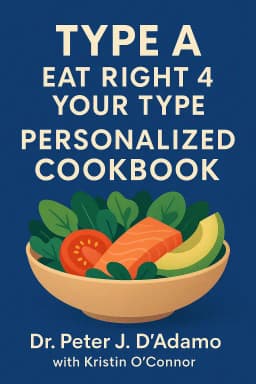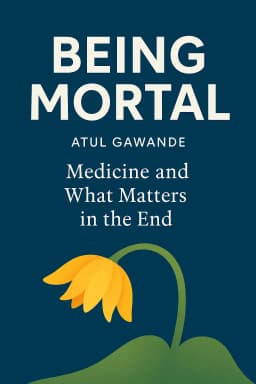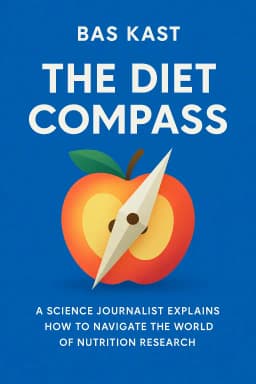
Personalized Podcast
Golden Hook & Introduction
SECTION
Orion: What if I told you that the stubborn dark circles under your eyes, that frustrating brain fog, and even the mystery weight gain you can't seem to shake, aren't separate problems? What if they're all distress signals from one single, overworked organ?
eck: That’s a provocative question. It suggests a central command center for problems we usually treat as completely unrelated.
Orion: Exactly. Today, we're diving into Anthony William's 'Medical Medium Liver Rescue,' a book that argues our liver is the unsung hero of our body, silently managing thousands of tasks we're not even aware of. And with me is eck, a fellow curious and analytical mind, who I know will appreciate the detective work this book invites us to do. This isn't just about nutrition; it's about rethinking the entire map of our health.
eck: I love that framing. History is full of 'unsung heroes' whose quiet work enabled great change. The idea that there's a biological equivalent is fascinating. We often focus on the more "glamorous" organs, like the heart or the brain, but maybe the real power lies in the background.
Orion: That's the perfect way to put it. The book argues we've fundamentally misunderstood this organ. So, today we'll dive deep into this from two main perspectives. First, we'll uncover the liver's true identity as the body's unsung hero, going far beyond its textbook definition. Then, we'll play detective and trace common 'mystery' symptoms back to the liver, revealing how it communicates distress.
eck: I'm ready. Let's peel back the layers.
Deep Dive into Core Topic 1: The Liver as the Body's Unsung Hero
SECTION
Orion: Great. And to understand this hero, we have to move past the simple idea of a 'filter.' Let's start with one of its biggest, most misunderstood jobs: managing fat. The book presents this incredible analogy that I think perfectly captures the strain we put on our liver.
eck: An analogy is always a good entry point for a complex idea.
Orion: Right. So, picture this. You start your day feeling clean, refreshed, ready to go. But right after you finish your breakfast, someone walks up and dumps a bucket of thick, greasy motor oil all over you.
eck: Okay, not a pleasant image. My day is immediately derailed.
Orion: Completely. You can't go to work, you can't focus, you can't do anything else. Your only priority is to stop everything, go home, take a long shower, scrub the oil off, and change into fresh clothes. It's a massive, resource-draining interruption.
eck: Of course. It's an emergency cleanup.
Orion: Exactly. Now, imagine you finally get clean, you get to your lunch break, and just as you're about to eat, it happens again. Another bucket of oil. So you have to go home and do the whole cleanup process all over again. And then, just as you're sitting down for dinner with your family, a third bucket of oil.
eck: At that point, I'm not just dirty. I'm exhausted. I'm irritable. My entire day, my entire energy reserve, has been consumed by just cleaning up this mess. I haven't accomplished anything else.
Orion: That's the core of the analogy. The book argues this is precisely what a high-fat diet does to your liver, meal after meal. It's not just about "unhealthy" fats, but the sheer volume of any fat. The liver has, according to the author, over 2,000 critical chemical functions—from storing vitamins to neutralizing pathogens. But when it's hit with that "bucket of oil," it's forced to drop everything and go into emergency cleanup mode. It has to produce a huge amount of bile to break down the fat, a process that takes immense energy.
eck: That's a powerful metaphor because it shifts the focus from the substance to the process. It's not that fat is inherently 'evil,' but that processing it is an incredibly resource-intensive task. It's a total system override. It makes me think about resource allocation in any complex system, whether it's a government or a corporation or a body. If all your resources are constantly being diverted to fight one recurring crisis, all the other essential functions—the long-term planning, the maintenance, the innovation—they all fall apart.
Orion: System override is the perfect term. The book explains that the liver is adaptogenic; it’s designed to handle different situations. It has different "codes" for fat intake. A little bit of healthy fat, it's 'Code Green,' business as usual. A high-fat meal, especially with unhealthy fats, it's 'Code Red-Plus.' The alarm bells are ringing, and all hands are on deck for fat processing. All other liver functions get put on the back burner.
eck: So, the conventional debate of 'good fat vs. bad fat' might be missing the point. The more critical question, from the liver's perspective, is 'how much disruption can the system handle?' It’s a question of operational capacity. You could have the highest quality 'good fat,' but if you're dumping a bucket of it on the system three times a day, the system is still going to be in a constant state of emergency.
Orion: Precisely. And that's where the "unsung hero" part comes in. The liver does this silently, day after day, protecting other organs like the pancreas from being flooded with fat. It takes the hit for the team. But eventually, this constant state of emergency takes its toll. The hero gets tired. And when it does, it starts sending out clues.
eck: Clues which we often misinterpret.
Orion: Which leads us perfectly to our second point. When the system is constantly overridden, it starts to fail in other areas, and that's when we see these so-called 'mystery' symptoms appear.
Deep Dive into Core Topic 2: Decoding 'Mystery' Symptoms
SECTION
Orion: So let's play detective. A common 'mystery' symptom is a skin rash, like eczema or psoriasis. The conventional approach is to treat the skin, right? You apply a cream.
eck: Right, you treat the symptom where it appears. It seems logical.
Orion: But the book argues that's like trying to fix a water-damaged ceiling without checking for the leaky pipe in the floor above. The skin is just the location of the outbreak; it's not the source of the problem.
eck: So where is the leaky pipe?
Orion: In the liver. The book presents this fantastic case study that I think illustrates the flawed detective work we often apply to our own bodies. Imagine a person who has been dealing with a skin flare-up. They're trying to figure out the trigger. One afternoon, their grandmother offers them a fresh, crisp apple. They eat it, and a few hours later, their rash seems worse.
eck: The immediate conclusion is obvious. "I'm allergic to apples," or "The apple caused the flare-up."
Orion: Exactly. They blame the apple. It’s the most recent, most obvious data point. But the book argues they're looking at the wrong timeline. The real cause, it suggests, was an egg-and-cheese sandwich and an antibiotic they had two days ago.
eck: Two days? That seems like a long time for a reaction.
Orion: This is the core of the idea. The book posits that certain foods, like eggs and dairy, along with things like antibiotics, feed pathogens—specifically, in this case, a virus like Epstein-Barr—that are residing in the liver. When these pathogens feed, they release waste products, which the author calls "dermatoxins." These are toxins that specifically affect the skin. But it's not an instant process. It takes time for the virus to metabolize these foods and for the dermatoxins to build up to a critical level in the liver.
eck: So the liver is like a holding tank for these toxins.
Orion: A holding tank that eventually overflows. After a day or two, the liver is so burdened that it has to push these dermatoxins out into the bloodstream to protect itself. The body's last line of defense is to push them out through the skin. So the rash that appears on day three isn't a reaction to the apple eaten on day three. It's the delayed result of the 'leaky pipe' in the liver from day one. The apple was just an innocent bystander.
eck: This is a classic case of confusing correlation with causation. It's a cognitive bias we see everywhere, from how we interpret stock market fluctuations to how we assess historical events. We crave simple, immediate cause-and-effect narratives. A complex, delayed process is much harder for our brains to accept.
Orion: You've nailed it. We want a single culprit we can identify and eliminate. "Apples are bad for me." It's a simple rule to follow.
eck: But the reality, according to this model, is far more complex. It requires you to be a much better historian of your own body. You can't just look at the last 24 hours. You have to consider the cumulative load on the system over days, or even weeks. It's not about the one event; it's about the conditions that led to the event. It’s the difference between blaming the final spark and understanding the pile of dry kindling that's been accumulating for a month.
Orion: That is a brilliant way to put it. And it applies to so many other 'mystery' symptoms the book discusses, from acne, which it links to Streptococcus bacteria in the liver, to brain fog, which it connects to neurotoxins released from the liver. The pattern is the same: a burdened liver, a slow build-up of toxins, and a delayed symptom that appears somewhere else in the body.
eck: It really reframes the body's signals. A symptom isn't a localized failure. It's a message from a central system under duress. And our job, as the recipient of that message, is to decode it correctly, not just shoot the messenger with a topical cream.
Orion: Exactly. It’s about learning the language of the liver.
Synthesis & Takeaways
SECTION
Orion: So, we have these two powerful ideas on the table. First, the liver is this incredibly complex, multi-tasking hero that we've reduced to a simple 'filter,' and we're constantly forcing it into emergency cleanup mode with high-fat diets.
eck: And second, that many of our most frustrating 'mystery' symptoms are actually delayed clues—distress signals—from that overwhelmed hero. It's about respecting the system's complexity and learning to read its signals more accurately, not just reacting to the most obvious, recent event.
Orion: The book, as you can imagine, outlines some very detailed and sometimes intense protocols to help the liver. But for anyone listening who is just curious, whose analytical mind is sparked by this, there's a very simple, non-intimidating starting point.
eck: And it's not about a drastic overhaul, which I think is important for motivation. It's about acknowledgment. The book suggests something as simple as starting your day with a glass of 16 ounces of water with the juice of half a fresh lemon.
Orion: It sounds almost too simple.
eck: But the principle behind it is what matters. It's not presented as a magic cure. It's a way of saying, 'I see you, liver. I'm giving you some gentle hydration and support before the day's 'buckets of oil' arrive.' It's a small, conscious act of recognition for that unsung hero. It's a way to start the day by supporting your body's logistics department instead of immediately putting it into crisis mode.
Orion: A perfect, motivating first step. It’s less about a radical diet and more about a shift in mindset—from ignoring the liver to acknowledging it. eck, thank you for bringing such a sharp, analytical, and even historical lens to this. It’s been a fantastic discussion.
eck: My pleasure. It’s given me a lot to think about. It seems the most important systems are often the ones we see the least.









